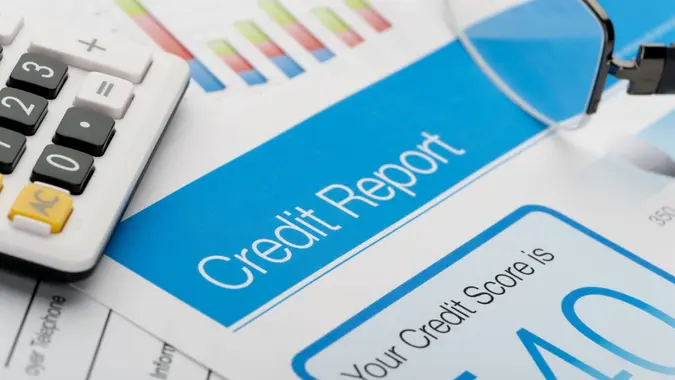5 Sneaky Ways You Don’t Realize Your Credit Score Is Costing You Money

Commitment to Our Readers
GOBankingRates' editorial team is committed to bringing you unbiased reviews and information. We use data-driven methodologies to evaluate financial products and services - our reviews and ratings are not influenced by advertisers. You can read more about our editorial guidelines and our products and services review methodology.

20 Years
Helping You Live Richer

Reviewed
by Experts

Trusted by
Millions of Readers
It’s hard to overstate the importance of a good credit score. A bad credit score can negatively affect everything from getting a loan, to your job prospects and savings goals to where you can live.
Poor credit impacts more than a third of Americans, and although people with lower income are most likely to have poor credit, it can affect everyone, regardless of income or economic status.
The worst part? It can cost you money. This happens in some obvious ways, like not qualifying for a good rate on a loan — or not qualifying at all and having to use expensive payday loan services.
But there are other, more sneaky ways your credit score could be costing you serious money — and you might not even realize it.
1. Lost Income Potential
Most states allow employers to run consumer credit reports on job applicants and existing workers to determine someone’s fitness for a new position or promotion. Having a poor credit score can be a red flag for hiring managers for a number of reasons. For example, it might tell them you have poor financial-management skills, which could be a huge negative if you’re applying for a job that requires managing money. When a low credit score jeopardizes your ability to get a job or raise, there’s an opportunity cost in lost wages.
The best way to avoid this problem is to improve your credit score — and one way to do that is with a credit-building tool like Instal by CreditStrong, which can boost your score in a hurry.
The idea is simple: Instal will issue you a $1,000 secured loan, which means the funds will be secured away so you don’t have immediate access to them. Each month, you’ll make payments toward the loan. CreditStrong reports the payments to the three major credit bureaus, which helps improve your credit score. Instal also comes with free monthly access to your FICO score, so you can closely monitor progress toward your credit score goals.
2. Higher Rental Payments
You can expect landlords and property managers to check your credit score when you apply for an apartment or home rental — and if your score is low, you can expect to either be denied a lease or required to pay more money. A FICOscore of 620 is considered “fair credit” and is often the starting point for landlords, according to Experian.
You can still rent apartments with bad credit, but you might have to pay more money upfront or agree to a higher rental price to help offset the landlord’s risk.
3. Higher Insurance Premiums
Like landlords, insurers often use credit information to determine whether they’ll offer consumers automobile or homeowners’ insurance policies — and to decide how much those policies might cost. States typically don’t allow credit-based insurance scores to be used as the sole basis for increasing rates or denying coverage, according to the National Association of Insurance Commissioners. But a low score might mean you won’t get the lowest rate, which means you’ll pay more money.
4. Slower Savings Growth
A poor credit score is often the result of having a lot of debt to pay down, especially high-interest credit card debt. You might be paying so much in debt every month that you don’t have much money left over to build savings or make investments. This costs money in the form of lost opportunities for potential interest and investment returns.
5. Fewer Credit Card Perks
As CNBC reported, the best rewards credit cards require the highest credit scores. If you have a good score, you can qualify for lucrative introductory offers, cash-back rewards, points and other perks. In some cases, you might even score discounts on merchandise, concerts and sporting events by qualifying for premium credit cards. Having a low score means you can forget about qualifying for these cards, which ends up costing you money.
 Written by
Written by  Edited by
Edited by 
























